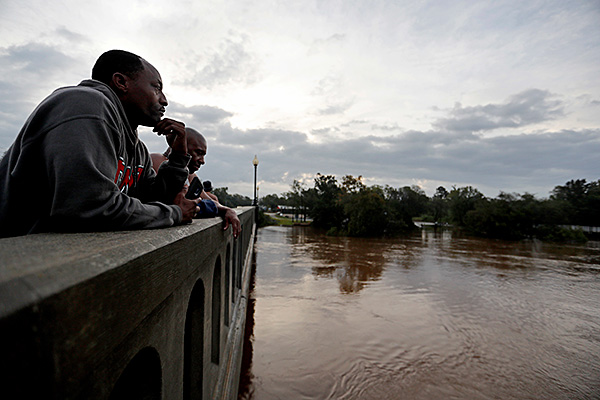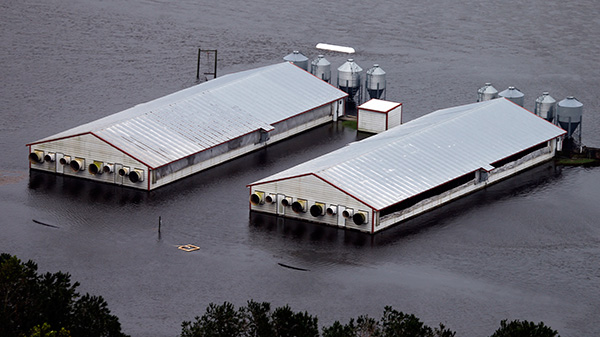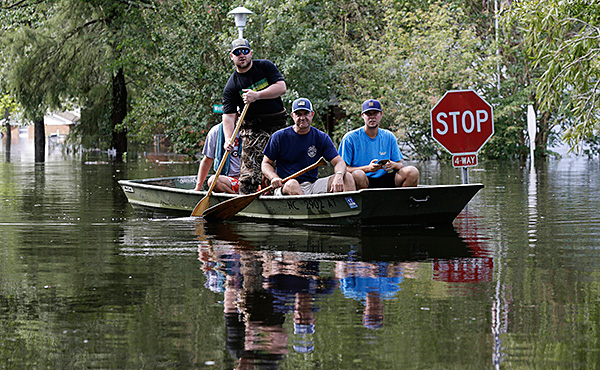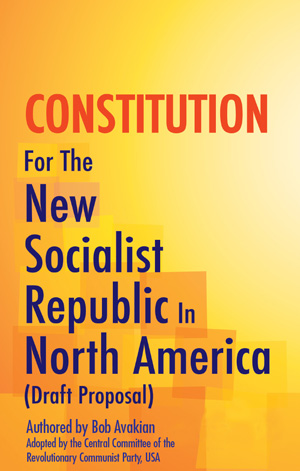Hurricane Florence Hits the Carolinas:
A Natural Occurrence—An Unnatural and UNNECESSARY Disaster
II. How Florence Hit the Poor, the Oppressed, and Immigrants Hardest
| Revolution Newspaper | revcom.us
Editors’ Note, October 15. This past week, Category 4 Hurricane Michael battered the coast of the Florida Panhandle before moving through Georgia, the Carolinas, and on to Virginia. Michael, which came less than a month after Hurricane Florence, was reportedly the most powerful storm ever to hit the Panhandle. It left death and massive destruction in its wake, including nearly obliterating the entire town of Mexico Beach where it made landfall.
Meanwhile, on October 8, two days before Michael hit Florida, a news report by the United Nations’ leading body on climate science, the United Nation’s Intergovernmental Panel on Climate Change (IPCC), warned that the climate crisis is not a far-off problem—it’s happening right now, and it’s accelerating more quickly and having more devastating impacts much sooner than previously understood. The report called for radical, “unprecedented” transformations starting immediately to reduce greenhouse gas emissions from fossil fuels to prevent a global catastrophe. A co-chair of the group of 91 scientists from 40 different countries who wrote the report calls the next few years “probably the most important in our history.”
In this five-part series on Hurricane Florence, we’ll examine how the capitalist-imperialist system of today fuels such hurricanes and worsens the death and destruction, and start to grapple with why and how it would be radically different in a genuinely socialist society.
Many middle class people—of all nationalities—have been impacted, even devastated by Hurricane Florence. The geographic terrain shapes where floodwaters rush the fastest and deepest. At the same time, the economic and social terrain has a tremendous impact on where those floodwaters and storms, and their aftermath, wreak their greatest havoc: they often have the most devastating consequences for poor, Black and other oppressed people, and immigrants.
Over 15 percent of North Carolina’s 10 million people live below the federal poverty line of $24,340 for a family of four. That percentage is double for Black people, Latinos, and Native Americans. People trapped below the poverty line, along with many just above it, are often too poor to have a car, or buy gas, or afford a place to stay outside the danger zone. Or they may feel compelled to stay to protect what little they have. So, many remained trapped, often fending for themselves, when they should be evacuating to avoid injury, even death.
Recovery is also skewed by this chasm of exploitation and racism. Over 80,000 people in North Carolina have already applied for federal disaster aid. That’s twice the number that applied for aid after the last major storm to hit North Carolina, Hurricane Matthew in 2016. Yet many poor and Black people are still waiting for federal aid they were entitled to after Matthew. And now some of them have been hammered again by Florence!
The town of Lumberton, which has a sizable Black population, is an example. It was flooded by Matthew and now by Florence. Yet there are 106 homeowners there who still haven’t gotten federal funds specifically allocated for “low- and moderate-income” homeowners (represented disproportionately by Black people) to rebuild or relocate after Matthew. Why? Because North Carolina has only spent $2 million of the $236.5 million it received specifically in 2016 for this purpose!
Cuts in the number of state government staff dealing most directly with oppressed areas is one factor that has contributed to this outrageous situation.1 Another big obstacle for the masses in getting relief is the difficulty many who are swamped with job or family responsibilities have in taking on the bureaucracy and its mountains of red tape. This can be very time-consuming, frustrating, and difficult—especially for those who may have just lost everything, including their personal records. (“North Carolina, a ‘Slow Spender’ State, Struggles to Hand Out Storm Aid,” New York Times, September 24)
This is one example of how poverty, white supremacy, and the workings of capitalism-imperialism shape the overall amount of disaster relief provided, who receives it, and who doesn’t, in this country. A 2017 study by the Kaiser Family Foundation of the impacts of Hurricane Harvey on Texans in the Gulf Coast region found that 34 percent of white residents had their applications for federal aid approved, compared to only 13 percent of Black residents.
In South Carolina, 62 percent of the prison population is Black. During Hurricane Florence, inmates at some of the state’s prisons were forced to remain locked behind prison walls—even as mandatory evacuation orders were being issued. Instead of being rushed to safety, they were put to work filling sandbags to protect property and people outside the walls!
Immigration officials said they would stop detaining immigrants during the hurricane, but many undocumented people were afraid to leave their homes—even when they were given mandatory evacuation orders. Many feared they’d be questioned, detained, and possibly separated from their children by immigration police. One woman in the flood-ravaged city of Wilmington told NBC News she was afraid to go to a shelter: “My smallest daughter, the little one, asked me, ‘Mom, I’m very afraid that our home is going to be destroyed, and I don’t want to go to a shelter because I don’t want to be separated from you. I would rather die first than be separated from you.’”
Socialist Society Can’t “Stop” Natural Disasters, but... Some Thoughts on How It Can and Will Respond in Radically Different Ways
Revolutionary state power and socialist society won’t be able to stop storms and natural disasters. But it would be able respond to them in radically different ways than this system does. At the same time, responding to the crisis, protecting lives, and bringing relief—in ways that contribute to advancing the revolution’s overall goals of uprooting all class and social divisions, here and around the world—would pose contradictions and challenges.
As we mentioned in Part I of this series, the major means of production—factories, land, resources, etc.—would now be in the hands of society as a whole in the form of state ownership. Economic development would be centrally planned while giving great scope to local initiative. In addition to advancing the world revolution and protecting the environment, the new socialist economy would be guided by meeting social needs, which the Constitution for the New Socialist Republic in North America (CNSRNA) describes as
creating a common material wealth that contributes to the all-around development of society and the individuals who make it up, and overcoming oppressive divisions between mental and manual labor, town and country, different regions and nationalities, and men and women.
In the case of natural disasters, this would mean a number of things. One would involve long-term efforts to transform cities, towns, and transportation systems to be environmentally sustainable. This would include working to minimize vulnerabilities to natural disasters and devoting resources to preparing for them ahead of time should they occur—not a last-minute chaotic dash to warn people, move supplies, etc.!
But it would take time and much ferment and debate over how—and even whether—to implement these radical steps. And the new revolutionary society would not have unlimited resources to respond.
However, the new state would have overall control of economic resources, and an orientation of unleashing and relying on the most dynamic factor in society—the creativity and initiative of the masses of people—as part of a collective process aimed at more deeply involving them in the governing of the new society and strengthening the bonds between people. Also providing real-time and ongoing relief commensurate with the level of the disaster would be a social priority—which would not be shaped by the imperatives, constraints, and objectives of a capitalist system.
During disasters, there have been many instances of people spontaneously putting aside their individual concerns and coming to the aid of others. Under socialism, this spirit will be amplified and given leadership and backing by the state, the revolutionary communist vanguard, and other elements of society, rather than being constrained and even suppressed. Students, technicians, scientists, and other volunteers from all over would be encouraged to come to the aid of those in the hardest hit areas and work and wrangle together with them over how to solve problems and how best to cut through the obstacles.
Compare this to the heartrending story of what happened to Lumberton. After the devastation of Hurricane Matthew, many of the town’s residents and its local government—including from south Lumberton, the poorest, mostly African-American precinct—tried to plan ahead. They worked extraordinarily hard to prevent disaster ahead of the storm and then rescue people. But their efforts weren’t backed by the system—they were blocked or largely ignored! Federal government aid was never distributed, as we mentioned above. Residents wanted to build floodgates to block a railroad underpass through which water flooded during Matthew. In response, the railroad threatened legal action, and the state government did nothing until the last moment. Even then, the railroad tried to physically prevent residents from temporarily blocking the passage. People also hurriedly built massive levees, but they were breached by record high floodwaters. One local official estimates that half of south Lumberton’s 2,000 residents won’t return.2
In the new socialist society, during disasters, those who had been incarcerated (justly, through a radically different legal system and process) would not be left in terror or to die—like many prisoners are in this putrid society. This could be controversial among the formerly oppressed because some of those locked up may well have carried out serious outrages against the masses of people. There could also be real difficulties involved in getting prisoners, along with everyone else, to safety. So struggle may have to be carried out to win people to the orientation that revenge, retaliation, or retribution shouldn’t enter into the new society’s approach to this, or any other, challenge facing it. Why? Because this works against—and leads someplace completely different than—the emancipation of all of humanity; it leads back to the horrors of the world and the system we live under and suffer under today.
Another dimension of dealing with natural disasters that would be radically different would be in relation to oppressed peoples. Under the CNSRNA, special and extra assistance would be provided to Black, Latino, and other formerly oppressed peoples who could still be hit harder by natural disasters thanks to this capitalist-imperialist system’s legacy. Immigrants and refugees will be welcomed and unleashed to play a vital role in the continuing transformation of society, not terrorized.3 And this would further a key overall goal spelled out in the CNSRNA of “overcoming historic inequalities”:
The state in the New Socialist Republic in North America and the planned economy under its direction take special measures for “raising the bottom up.” This principle serves the crucial task of overcoming historic inequalities affecting the formerly oppressed nationalities, and other profound disparities in society. The whole of society will be mobilized to overcome these inequalities. Priorities in distribution of needed social goods and services (like health and housing) will be guided by this principle. The socialist economy also gives priority to overcoming gaps between the more developed regions and areas and the less developed.
Given the racism and white supremacy that has been so deeply baked into today’s society—economically, politically, socially, culturally, and ideologically—this would require political and ideological struggle to win growing millions to understand, support, and become directly involved in these efforts.
The revolutionary state and society would aim to give leadership to turn this into a positive process, raising people’s consciousness about the history of national oppression and its deep connections with this oppressive system overall, break down barriers, and forge new ties between people, but this would be a very contradictory, tumultuous process.
***
NEXT: Part III: Outlawing Climate Science to Serve Profit-Driven, Environmentally Destructive Development
A 325-mile-long string of narrow sand islands—barrier islands—form North Carolina’s outer coast. These islands and their wetlands are breathtakingly beautiful, yet also extremely vulnerable to rising seas and devastating storms. People have a great need for recreation, natural beauty, leisure time—the question is how is that going to be done? Is it going to be driven by profit, in an environmentally devastating way that privileges access to those with the greatest means? Or is it going to be done in ways that preserve the natural environment and make it widely accessible to all?
1. Fully analyzing the driving forces behind current state budget deficits and such budget cuts is beyond the scope of this article. But they, too, stem most fundamentally from the predatory workings of capitalism-imperialism and the distorted, profit-driven priorities it enforces. They also often result from the bitter struggle within the ruling class, a struggle which has led to the empowering of the Trump/Pence fascist regime, over which governing and social contract best serves the needs of imperialism today. For a relevant analysis, see “The Shutdown, the Showdown, and the Urgent Need To Repolarize... For Revolution,” revcom.us, October 19, 2013. [back]
2. Doug Bock Clark, “Two Years After a Devastating Hurricane, a North Carolina Town Is Again at the Center of the Flood,” New Yorker, September 18, 2018 [back]
3. See “H. Immigrants, Citizenship and Asylum,” Constitution for the New Socialist Republic in North America, authored by Bob Avakian, pp. 60-63. [back]

Floodwaters and storms, and their aftermath often wreak their greatest havoc on poor, Black and oppressed peoples, and immigrants. Overlooking Cape Fear River, North Carolina, flooded by hurricane Florence, September 2018. (Photo: AP)

Pig farms in Lumberton, North Carolina, remain flooded after hurricane Florence. (Photo: AP)

Residents of Lumberton navigate flooded streets in search of people who need help. Often, during disasters, many people spontaneously put aside their individual concerns and come to the aid of others. Under socialism, this spirit will be amplified and given leadership and backing by the state, the revolutionary communist vanguard, and other elements of society. (Photo: AP)
CONSTITUTION For The New Socialist Republic In North America
(Draft Proposal)
Authored by Bob Avakian, and adopted by the Central Committee of the RCP
Get a free email subscription to revcom.us:

Volunteers Needed... for revcom.us and Revolution
If you like this article, subscribe, donate to and sustain Revolution newspaper.

